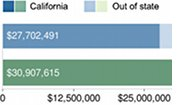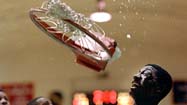Teacher Responses
The following is a list of teacher responses to their "value-added" ratings. In Aug. 2010, teachers were also invited to comment on their 2009 ratings.
The Times gave LAUSD elementary school teachers rated in this database the opportunity to preview their value-added evaluations and publicly respond. Some issues raised by teachers may be addressed in the FAQ. Teachers who have not commented may do so by contacting The Times.
|
|
 Delicious
Delicious
|
 Digg
Digg
|
 Facebook
Facebook
|
 Twitter
Twitter
|





While I am pleased that my test scores reflect effective teaching, I question the role the LA Times has taken in making this information public. I also question the role LAUSD has not taken in eliminating ineffective teaching. My wish is for all students to receive effective instruction. I also wish for the district to remedy the problem when students are in a classroom where effective instruction is not taking place. With effective instruction all students will show growth, no matter who their parents are or where they live.
April 8, 2011 at 3:25 p.m.
This job is a great joy in my life. In an effort to grow both as an educator and as a human being, I have dedicated a great deal of time, money, and spirit to improving myself and my craft. Each student I have had has taught me a great deal and has been a great gift in my life. I am thankful for every day I have spent as a teacher.
April 8, 2011 at 2:16 p.m.
A red line that is a GUESS! Shaded areas that I'm either more effective or most effective in math and can be least effective, less effective, average or more effective in language arts. Moreover this time the Times dropped the fact that there is more change in math scores and does not have an overall rating which last time had me rated as more effective. Meanwhile if you read the fine print they added in best guess adjustments for english language learners, poverty, gender and parent educational achievement. They admit no adjustments for special education or the fact that classes are not randomly assigned to teachers which is required for a true value added analysis. In my case, as a rare male elementary teacher, I am given the high energy boys. This alleged analysis is based on a series of unproven assumptions.
April 8, 2011 at 12:16 p.m.
I have not worked for the district or as a teacher for four years and would prefer my name not be published. Thank you, Deborah Abram
April 8, 2011 at 10:25 a.m.
Although the value added scores supposedly reflect only one aspect of a teacher's work, the mere publication of these scores for the world to see, sends the message that test scores are the most important data from which to judge a classroom. The real value added score should be the beneficial effects of what students are able to do with the tools they gather in all of their classrooms throughout the years.
April 7, 2011 at 5:30 p.m.
What about teeachers who did not teach in grades 3-6, or those who taught otherr than math and English. How is the effectiveness of those teachers being rated?
April 7, 2011 at 3:20 p.m.
I was Average in ELA when the scores came out in the Fall. I am now brought down to less effective! Last year's test scores are what was added in. In ELA, of my 29 students, I had 16 students move up a level. The final scores were 16 Advanced, 10 Proficient, and only 3 were Basic. The class total points went from 10,845 to 11, 683. I don't know your formula, but something is drastically wrong here. I can mail you my scores print out. I believe you are putting out false information and I have proof to back this up. Please do your math over!
April 7, 2011 at 2:36 p.m.
How can you rate my effectiveness after just ONE year back in the classroom after being a Math coach for eight years? I would love to share with you the details of my class last year. It is insulting that I am rated "least effective" in English without all the facts. I am canceling my subscription to the Times after over 30 years. Thank You.
April 7, 2011 at 12:18 p.m.
The classrooms that are represented in this data are GIFTED and ADVANCED students who made little progress because they stayed at the Advanced and Proficient Range. The test changes from 3rd to 4th grade in their expectations. So the fact that I was able to maintain their scores at their current level shows more progress than me lifting students from B or BB to P or A. As a gifted teacher I find this information inaccurate and libelous saying I'm ineffective in sustaining and raising student scores on a test that is given only once a year, without taking into consideration the populations and areas I work in, or the students progress throughout the year.
April 7, 2011 at 11:57 a.m.
You show me teaching 2005-2010, but I started teaching at Menlo Ave. Elem., LAUSD, in 1995. I have state standardized test scores dating back to that time, as I've always taught 3rd, 4th, or 5th grades. I've taught 20 to 32 students each year. When I looked at this website in August,
you showed me as most effective for 6 years. I'm a bit confused. Are you showing me most effective for 6 years still? Does 2010-2005 encompass 5 or 6 years? But in addition, I had very high scores released after you first released this data, that would be at least 7 years in a row. However, I always keep in mind that the CST scores are but one measurement of a student's success. I work with Sierra Club's Inner City Outings to provide my students wilderness experience, important for our inner city youth. I've also done numerous curricular trips each year to bring them to museums, concerts, and other cultural and curricular events, including seeing the play THE LION KING. Some years I take them on train trips to Carpinteria or for swimming lessons at the L.A. Olympic Swim Stadium in Exposition Park. But all this pressure around state testing makes officials nervous about teachers taking kids on trips--kids who desperately need their classroom extended into the widercommunity. How do you measure the value of a trip? I'm so sad these test scores loom threatingly over teachers to cause stress and distress undermining our teaching. LA TIMES doesn't talk about the challenges of inner city schools anymore--dealing with community poverty, crime, gangs, lack of food in the homes, drugs, single working parents, undocumented immigrant parents, no English at home, poor attendance, lower education, etc.--all which affect academics. Everything comes down to a state test score and the fault of only a teacher if it's not high. What a shame. You ought to do some deep investigative reporting to find out how really hard and successful inner city teachers and students are--in spite of the attacks on us and the odds against us.
April 6, 2011 at 5:39 p.m.